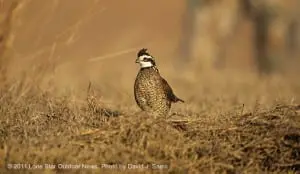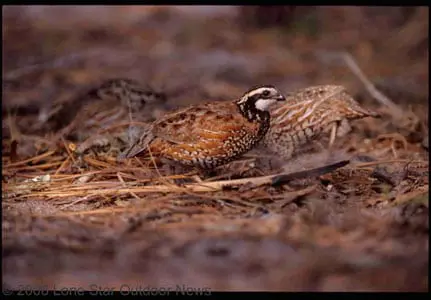By Texas Parks and Wildlife Department,
Predictors leading up to the season showed bobwhite numbers down across the board, due in large part to dry conditions last winter that left hens scratching to get by. Untimely rainfall during the latter part of the summer also could have an impact on nesting success, and the recent deluges that have hammered much of the state, in combination with an unexpected cold snap, may not bode well for late hatch efforts.
This year’s quail season opens Saturday, Oct. 27.
TPWD projections
“Our surveys statewide indicate bobwhite numbers are below the 15-year average, and that’s due mainly to the weather,” said Robert Perez, upland game bird program leader with TPWD. “That doesn’t rule out hotspots where quail production did maintain some birds. Our surveys don’t fine tune down to the county level, but overall, right now it’s just a big unknown.”

Photo by David J. Sams, Lone Star Outdoor News
Although production appears down this year, Perez is hoping late nesting birds will help fill the gaps, providing they escaped flooding. Like most things quail, there are no guarantees. TPWD landowner and hunter surveys indicate that quail hunters are likely to limit harvest in poor years. Research supports the practice of self-regulation in quail pastures, so enough breeders remain to boost populations when conditions improve. Landowners/hunters can contact their county biologist for site-specific recommendations and harvest guidelines.
“This past winter was exceptionally dry across all of quail country, especially in the Rolling Plains where some places went without any precipitation for 100 consecutive days,” said Perez. “Unfortunately, these conditions can reduce the availability of foods like winter greens which are needed to get quail into breeding condition. Spring was also dry over much of these areas with few exceptions. Fortunately, quail are opportunistic when it comes to the breeding/nesting season and can take advantage of the rains even if they come late like they did this summer.”
TPWD projections are based on annual statewide quail surveys that were initiated in 1978 to monitor quail populations. This index uses randomly selected, 20-mile roadside survey lines to determine annual quail population trends by ecological region. This trend information helps determine relative quail populations among the regions of Texas.
Comparisons can be made between the mean (average) number of quail observed per route this year and the 15-year mean for quail seen within an ecological region. The quail survey was not designed to predict relative abundance for any area smaller than the ecological region.
A regional breakdown of this year’s TPWD quail index survey, including highlights and prospects, is available online.
Quail hunting season runs through Feb. 24, 2019. The daily bag limit for quail is 15, with 45 in possession. Legal shooting hours for all non-migratory game birds are 30 minutes before sunrise to 30 minutes after sunset.


